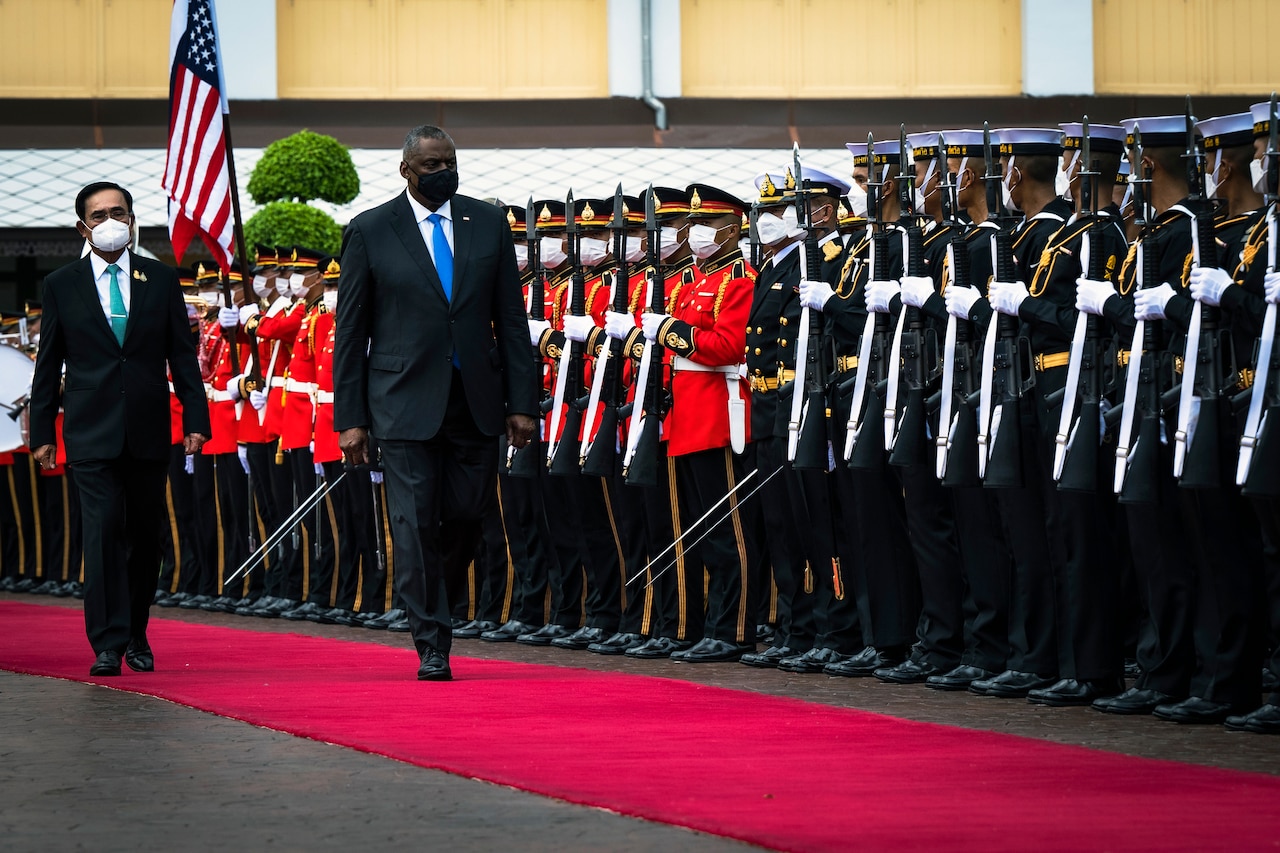
The Indo-Pacific is a U.S. national security strategy priority, but the United States is a global power with global interests and responsibilities, and "we are walking and chewing gum at the same time," Secretary of Defense Lloyd J. Austin III said today in Bangkok.
As the United States works toward a free and open Indo-Pacific it also is leading the effort to supply Ukraine with the arms, ammunition and supplies it needs to defend itself against an unprovoked war.
Further, the U.S. military has worked to reassure NATO allies with the addition of more than 20,000 U.S. service members in the European theater. At the same time, there are 300,000 service members serving in the Indo-Pacific.
The reason the United States can "walk and chew gum at the same time" is because of the unparalleled network of allies and partners.
Austin's current trip around the world is an example how the U.S. values and relies on that network of allies. The trip started with a meeting with Canadian Prime Minister Justin Trudeau at the command that symbolizes the close bond between the two countries — the North American Aerospace Defense Command in Colorado Springs, Colorado. From there, Austin went to the Shangri-La Dialogue in Singapore and then to Bangkok, where he conferred with the United States' oldest treaty ally.
Austin spoke to reporters at the end of his meetings with Thailand Prime Minister and Minister of Defense Prayut Chan-o-cha to put the trip into perspective.
At Shangri-La, Austin delivered a major speech about "the centrality of this region to vital U.S. interests and the vision for a free and open Indo-Pacific that we share with our regional allies and partners."
And the secretary also used the gathering of defense ministers to participate in bilateral and trilateral meetings with allies and partners. These included Singapore, Japan, South Korea, Indonesia, Vietnam, the countries of the Association of Southeast Asian Nations, Australia and China.
The secretary plainly laid out U.S. concerns and proposals for the region. He spoke about the need for communication between China and the United States to lessen the chances of an escalation. He spoke of concerns over China's behaviors as it tries to assert control over international waterways and air lanes. He also said the United States "never shies away from honest competition, but we don't seek conflict, nor do we seek a region that's split into hostile blocks."
The dialogue "was an important opportunity to raise our concerns about the potential for instability in the Taiwan Strait and to underscore that our long-standing policy toward Taiwan is unwavering and unchanged," he said.
Austin worked with allies to increase cooperation across the region.
His stop in Bangkok is another piece of this effort to increase cooperation across the region. The United States military is working with Thailand's forces to modernize the military. Discussions centered on this and increasing the complexity of an already large exercise program headlined by the Cobra Gold series.
Now, the secretary will travel to Brussels for the defense ministerial — the last such meeting before the NATO Summit in Madrid that begins June 28.
While the ministerial is important "my first order of business will be convening the Ukraine defense contact group for the third time," Austin said. "That's going to be an important opportunity to gather our growing group of partners from around the world to ensure that we're providing Ukraine, what Ukraine needs right now in order to defend against Russia's unjustified, unprovoked assault."
The group will also look at what Ukraine will need in the long run to build and sustain defenses. "We'll hear directly from the Ukrainian leaders, led by my good friend and counterpart Oleksii Reznikov, and we'll work to intensify our shared efforts to meet Ukraine's priority requirements to defend itself," he said.
The bottom line to all this is that the United States can deal in two theaters and with two competitors and then some. He said the number of operations, exercises and training events that the U.S. has conducted with Indo-Pacific allies and partners over the past year "... is impressive in and of itself."
Austin continued, "But by the same time, we've been able to not only to help to unify NATO, we've also led the effort to rapidly rush much needed security assistance to Ukraine with the help of allies and partners," he continued.
President Joe Biden has been instrumental in solidifying NATO and other nations opposition to Vladimir Putin's unjust war — first by sharing intelligence openly about Russia's intentions and then in his quick response to the invasion itself, Austin said.
"[NATO] is more united than I've seen it, and I've been associated with NATO since … 1975 when Lieutenant Austin first started down that road," he said. "So, we are walking and chewing gum. And we're able to do that because the strong network of alliances and partnerships that we have around the globe."
"time" - Google News
June 14, 2022 at 04:07AM
https://ift.tt/0tYHgAy
Austin: How the U.S. Walks, Chews Gum at the Same Time - Department of Defense
"time" - Google News
https://ift.tt/FqDuZbX

No comments:
Post a Comment